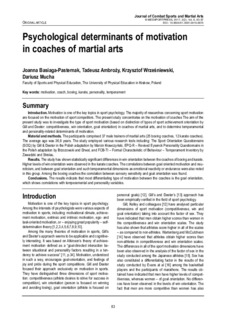Psychological determinants of motivation in coaches of martial arts
Date
2017Author
Basiaga-Pasternak, Joanna
Ambroży, Tadeusz
Wrześniewski, Krzysztof
Mucha, Dariusz
Metadata
Show full item recordAbstract
Introduction. Motivation is one of the key topics in sport psychology. The majority of researches concerning sport motivation
are focused on the motivation of sport competitors. The present study concentrates on the motivation of coaches The aim of the
present study was to investigate the type of sport motivation (based on distinction of types of sport achievement orientation by
Gill and Deeter: competitiveness, win orientation, goal orientation) in coaches of martial arts, and to determine temperamental
and personality-related determinants of motivation.
Material and methods. The participants comprised 37 male trainers of martial arts (25 boxing coaches, 12 karate coaches).
The average age was 36,8 years. The study employed various research tools including: The Sport Orientation Questionnaire
(SOQ) by Gill & Deeter in the Polish adaptation by Marcin Krawczyński, EPQ-R – Revised Eysenck Personality Questionnaire in
the Polish adaptation by Brzozowski and Drwal, and FCB-TI – Formal Characteristic of Behaviour – Tempe rament Inventory by
Zawadzki and Strelau.
Results. The study has shown statistically significant differences in win orientation between the coaches of boxing and karate.
Higher levels of win orientation were observed in the karate coaches. The correlations between goal oriented motivation and neuroticism,
and between goal orientation and such temperamental dimensions as emotional reactivity or endurance were also noted
in this group. Among the boxing coaches the correlation between sensory sensitivity and goal orientation was found.
Conclusions. The results indicate that most differentiating type of motivation between the coaches is the goal orientation,
which shows correlations with temperamental and personality variables.

